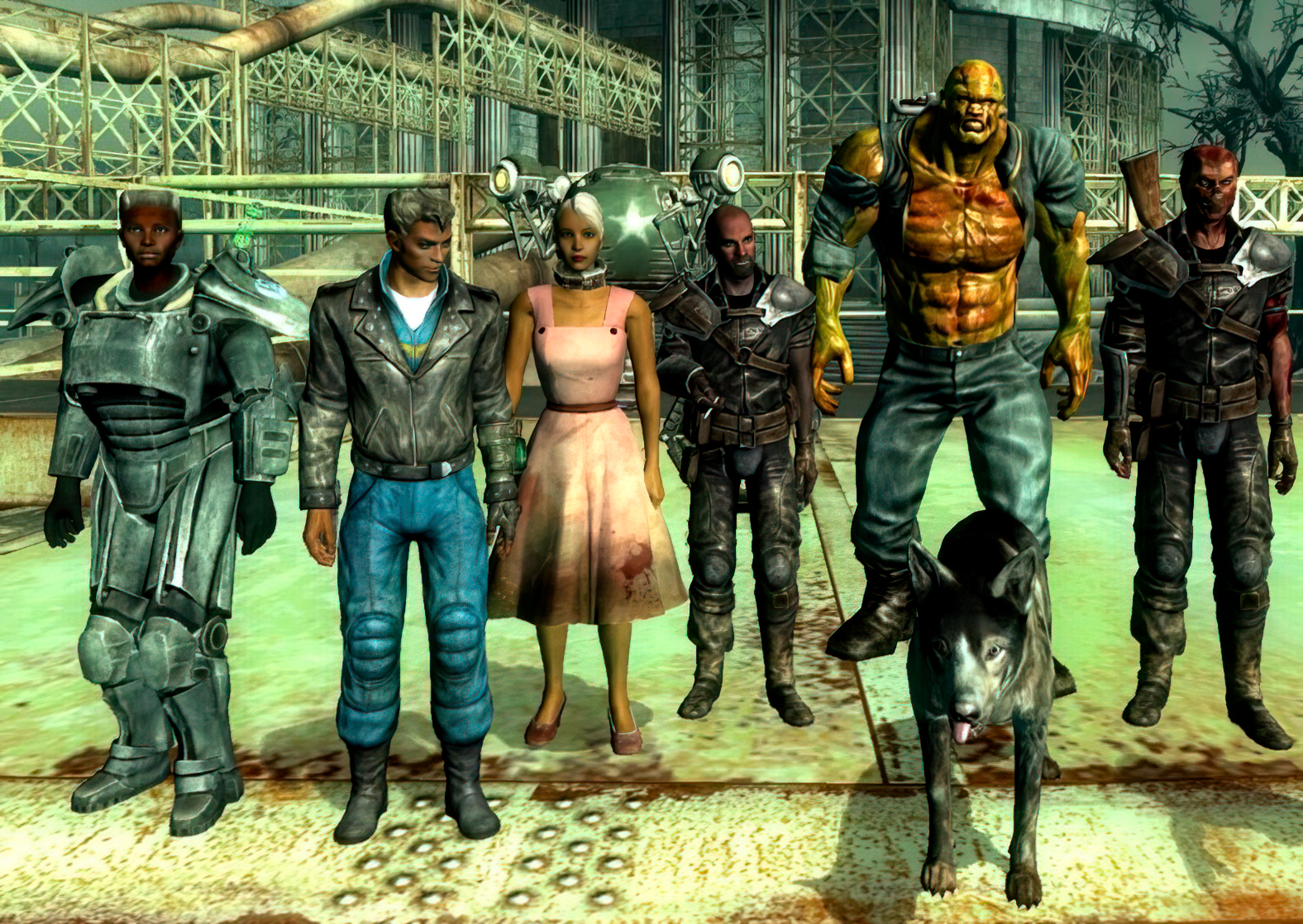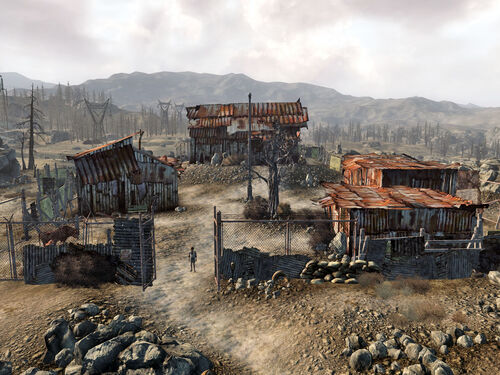Fallout 3 had an ending. It just wasn't any good.
Massive spoiler warning, obvy, but the game concluded with you having to brave massive radiation in order to purify the water in the DC area, making aqua pura avaialable for everyone at the cost of your own life (or Sarah's life). Why is this such an annoyance? It's an annoyance because the lethal dose of radiation that would absolutely kill you, that would drop you into a body bag, would not harm at least three of your companions. Three of your companions who are standing by idle, waiting for you to die in the radiation that would not possibly hurt them. You have a robot, or a super mutant, or a ghoul in your party, and they're not susceptible to radiation at all, yet they still refuse to enter into the memorial, and purify the water.
That was stupid, and it set up one of the silliest endings in video game history, that you had to choose between dying and sending someone else to their death, while you had companions standing idle who refused to enter for no good reason. Now, eventually the good producers of the game smartened up, and changed the game. For you see, Fallout 3 is an open world game, and you can go wherever you want, from the republic of Dave all the way to Arefu, and as an open world game, there's not really and
end, per se. And after they released downloadable content, they got rid of the end of the game. After you purified the water at the Jefferson memorial, the game didn't end anymore, at least not at that point. There was still fighing to be done against the enclave using Liberty One, and the broken steel add-on meant that you could continue the fight. But after you destroyed the Enclave at their base, ruining any chance they'd ever have of coming back, the game keeps going. You could move onto new DLC, you could go to Mothership Zeta, you could go to the Pitt, but the game didn't have an ending proper anymore. The credits never rolled again.
So what to do? You see, the game will point you in key directions for quite a while, helping you to see and to experience the wild wasteland, but all the quests are over at that point. There is nothing specifically left for you to do. It never really ends.
It's funny that the Book of Revelation comes up intensely in the game, up to and including the point where the game calls the final quest 'the waters of life,' directly referencing Revelation, and the end of all things. And this, this is important. It's important because the Bible ends at that point, when the sky rolls back and everything grinds to a halt. And when that happens, history is over. And the game does seem to have an Alpha and an Omega, it does seem to have a beginning and an end. Just like Christian history has a set beginning in Genesis, and a set end in Revelation. And when Jesus talks about himself as the Alpha and the Omega, he does so to say that there was nothing before him, and there will be nothing after him. And yet, after they revised the ending to the game, it didn't have an alpha and an omega anymore. Oh, sure, there was still a beginning, but there was no conclusion. After you finished the story mission, the game just keeps on going. That's what we call an open world game.
But the Christian life is essentially like an open world game, because expected progression only gets you so far. If you're like the average North American protestant, you get only so far, and they you stop. You get through Sunday school, you get through Confirmation, you get through the relative progression that leads you to 'um, now what?' The story missions are all over, and now you get to explore the open world of it all. The big, enormous open world. And then what do you do? What do you do if nobody's telling you what to do anymore?
It's a good question, and one that regularly stumps our confirmation graduates. As they get to the end of their story based missions, the main missions that drive the plot, then the game no longer holds their hands and tells them where to go. The game is still running, the world out there is still what it used to be, and there are many quests that are repeatable perpetually, but there is no more straight logical progression. And this is where we lose people, almost every time. The main story is done, the missions that lead one to another have stopped, the exclamation marks on the map are all gone, and that seems to be all there is to it.
Now, here's a quick question for those of you playing along at home. Once the kids have been confirmed and have disappeared, what is the very next time we're likely to see them?
Spoiler alert, it's this one.
What happens in the meantime? Who knows, really. The kids who disappeared, and who are only around for confirmation, marriage, and to baptize their babies, they're the ones who can't really work with an open world, in which the conditions for moving forward aren't spelled out for you. You have to find your own quests to complete, you have to find your own places to go, and your own experiences to level up with.
You see, if you spend some time in the world, you'll find your own quests to complete. You'll find a way to extend the life of the game outwards. You'll find your own responsibilities to do and to accomplish. One of the best ways that Fallout did this was to insitute a couple of factions roaming
around the wastes, who had their own goals and objectives. One of my personal favourites was after rescuing a squad of mercenaries from the rooftop of the statesman hotel, you can be enlisted into their ranks. You become one of Reilly's Rangers. And Reilly herself will offer you a suit of their battle armour to wear, and gives you a permanent, perpetual quest to map the wastes, giving you money for each location visited. And it wasn't about the money. It was about finding a way to take on that role and responsibility, about making this world my own. And I loved that armour, too. It was great to instead of wearing random pots and pans cobbled together from raiders, to wear something that marked me as part of a cohesive team.
This is vitally important to the way the game works, as it changes it from something that drags you around, shiny spot to shiny spot, into a world in which you believe that you have sincere agency. If you remember my discussion about Bioshock, that game revealed itself as being a game in which the central theme was that you didn't have control. You were led about, as a player character, from checkpoint to checkpoint, almost as though it was a racing game, and not an FPS RPG. You know how racing games work, which is that you're in a car (or kart), and the other racers are in similar cars
(or karts), and you're moving on a set path to a set destination. And there may be shortcuts, but they just take you back to the main course after a tiny deviation. And that's what Bioshock was about. It was interesting, full of life, a very pretty game with a heaping tonne of atmosphere, but the gameplay itself was linear progression through checkpoints. Now, contrast that with the way Fallout works, in which you have key quests to accomplish, but thousands of other little quests in the meantime. You can find yourself bringing water to beggars, collecting fingers for the regulators, giving money to the church on Rivet city, or any number of thousands of things that make this into a world in which things happen, and people live. And you have a choice, which is to either blaze through the game as quickly as possible, or to find pleasure in the sidetracks, and find your own reason for doing what you do beyond just what you're told to.
As I said earlier, the Christian experience, with its clear progression then open world, is like that. There are set checkpoints to attain, baptism, Sunday school, Confirmation classes, confirmation, then..... what? Then, with the open world set up before you, you get to decide your own level of immersion. There will no longer be any stars on the map, any exclamation points, instead, it's up to you to decide how deep your involvement goes. You can take on your role in Reilly's Rangers by joining a board or committee. You can become a regulator by being an elder or a trustee. You can upgrade your stats and level up in Bible study, but know that the main story quests wrapping up isn't the end of the game. It just means that you have been equipped, you have leveled up sufficiently to explore the major content before you. You are now able to take on the challenges of the open world before you. The world both of the church, and of the world itself.
Now, a quick aside before I close the book on Fallout 3. The game itself is perhaps as close as I've ever come to a genuinely immersive experience, mainly because of the open ended nature of what it asks you to do. You can talk your way out of problems instead of fighting your way out of them. You can use science and medicine to accomplish your goals. You can choose to go from main quest to main quest, or you can explore why there are an alarming number of dead bodies in a certain burned out shack. You can free slaves or make them, you can destroy towns or save them, and all the way through, the options are almost as wide open as they are in life. It's the real definition of an open world, and the only question to you as a player is how deep do you want to go, because the game, the church, life, goes as deep as you want it to.





No comments:
Post a Comment